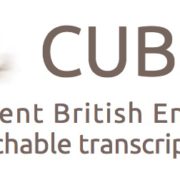The CUBE searchable dictionary
This post is to share a video I’ve made explaining some of the features of the searchable pronunciation dictionary CUBE. Co-edited by myself and Péter Szigetvári, CUBE is freely available at www.cubedictionary.org.
CUBE Pronunciation Dictionary
The free online pronunciation dictionary CUBE, with many search options.
Being a pronunciation dictionary, CUBE includes no word definitions; it gives only one recommended pronunciation per entry, and is currently limited to British English. But it has a wide range of search capabilities and options which make it useful both for practical reference and for research purposes. I cover a number of its features in the video:
1:25 Results can be displayed in alternative transcription systems
2:09 Words are linked to recordings in context, courtesy of the site Youglish
4:07 You can request missing words to be added (usually within 24 hours)
4:39 Part-word searches
5:01 Word edge searches
5:35 Results can be sorted by frequency of occurrence (on the internet)
6:55 You can search for sounds rather than spellings, using normal ASCII characters
8:02 You can search for sound categories (eg vowels, consonants, fricatives, nasals)
8:49 You can search for for minimal pairs
CUBE has still other capabilities, which can be explored via its various explanatory pages. The user can search by syllable count, and by stress pattern. Searches can be limited to more frequent or less frequent words. A wide range of grammatical features can be specified or excluded when making searches. And there are various ways in which search results can be displayed: the user can tweak symbol choices to some degree, and we’re beginning to allow accent variations to be shown. I intend to make a follow-up video before long.
I hope you enjoy exploring CUBE. If you have comments or suggestions, there’s a Comment button on the homepage; you can also leave comments here, or on the video at YouTube.

